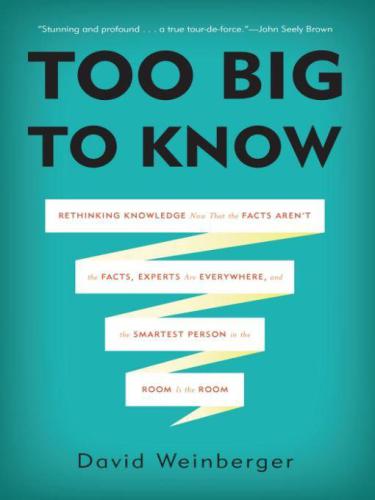
Too Big to Know
کتاب های مرتبط
- اطلاعات
- نقد و بررسی
- دیدگاه کاربران
نقد و بررسی

December 12, 2011
Weinberger (Everything is Miscellaneous), a senior researcher at Harvard's Berkman Center for the Internet and Society, engagingly examines the production, dissemination, and accessibility of knowledge in the Internet era. The fundamental and pertinent question Weinberger pursues is how the new surplus of knowledge afforded by the Internet affects our "basic strategy of knowing." This strategy evolved from "book-shaped thought," a form "in which parts depend upon the parts before it." Unlike books, however, Weinberger contends that long-form argument on the Internet engages a more dynamic dimension than a static book ever could: it is "put into a network where the discussion around it will violate its pristine logic." Despite the slight incompatibility to long-form argument, ideas, and knowledge on the Internet are plentiful, hyperlinked, autonomous, open, and, perhaps most importantly, unsettled, making the Internet a forum within which knowledge is not merely accepted; it is contemplated and questioned. While occasionally tending towards the philosophical, Weinberger's book is full of relevant and thought-provoking, insights that make making it a must-read for anyone concerned with knowledge in the digital age.

January 1, 2012
Razor-sharp analysis of the state of knowledge in the age of computer networking. Weinberger (Everything Is Miscellaneous: The Power of the New Digital Disorder, 2007, etc.), a senior researcher at Harvard's Berkman Institute for Internet and Society, argues that the collaborative, hyperlinked, instant nature of the Internet has fundamentally altered the way humans relate with knowledge. In the Gutenberg age, because of the finite nature of the book, limited by both its number of pages and the number of copies that could be printed, knowledge was necessarily ordered and hierarchical. The author added pieces to the collective store of knowledge, while publishers, editors, librarians and the community of scholars decided for the common good what was and was not important to know. The Internet has radically upended that hierarchy and knocked down the walls of the knowledge store. In 1989, pundits worried that with 1,000 books published in the world every day, people were suffering from information overload. That was small potatoes, it turns out. In 2008, Weinberger writes, Americans consumed 3.6 zettabytes, "a number so large that we have to do research just to understand it." The author suggests that we make peace with this overwhelming state of affairs, and it seems many of us already have. The democratizing of knowledge is not without its dangers. Bad information has equal access to the common well with good information, and is just as viral. But crowdsourced and refereed resources like Wikipedia give Weinberger hope. The difference between the old style of knowing and the new one is embodied in the differences between a set of encyclopedias and Google. One can fit on a shelf; the other is uncontainable, essentially "an infrastructure of connection." A witty and wise companion in this new age of information overload.
(COPYRIGHT (2012) KIRKUS REVIEWS/NIELSEN BUSINESS MEDIA, INC. ALL RIGHTS RESERVED.)

March 1, 2012
The Internet has changed how society gains information. Today's weather forecast, political commentary on U.S. relations with the Middle East, and tips for using the latest software can all be obtained in seconds through a search engine. Weinberger (senior researcher, Berkman Ctr. for the Internet & Society, Harvard Univ.; Everything Is Miscellaneous: The Power of the New Digital Disorder) asks whether the increased availability of information has changed what most people know and whether it is changing knowledge itself. He explores the benefits and drawbacks of our thoroughly connected culture, using several examples to illustrate how the knowledge paradigm is changing--once information was sought from experts, and now it is gleaned from networks. Although Weinberger does provide some insightful answers, this book may be even more valuable as a catalyst for further discussion. VERDICT A thought-provoking work that is both reassuring and daunting, this will appeal to all readers but will be of special interest to anyone studying information technology. Recommended.--William Baer, Georgia Inst. of Technology Lib., Atlanta
Copyright 2012 Library Journal, LLC Used with permission.

























دیدگاه کاربران